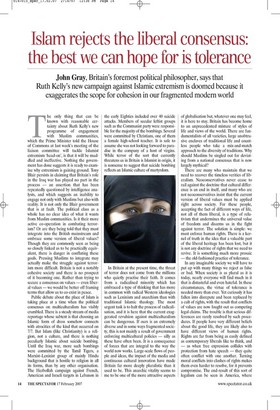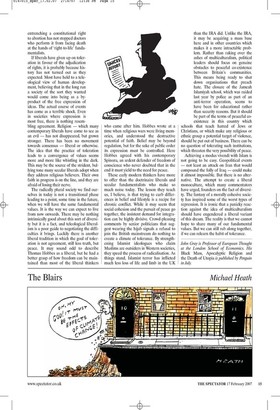Islam rejects the liberal consensus: the best we can hope for is tolerance
John Gray, Britain's foremost political philosopher, says that Ruth Kelly's new campaign against Islamic extremism is doomed because it exaggerates the scope for cohesion in our fragmented modem world The only thing that can be known with reasonable certainty about Ruth Kelly's new programme of engagement with Muslim communities, which the Prime Minister told the House of Commons at last week's meeting of the liaison committee will tackle Islamist extremism 'head-on', is that it will be muddled and ineffective. Nothing the government has done suggests it is ready to examine why extremism is gaining ground. Tony Blair persists in claiming that Britain's role in the Iraq war has played no part in the process — an assertion that has been repeatedly questioned by intelligence analysts, and which suggests an inability to engage not only with Muslims but also with reality. It is not only the Blair government that is at fault. The political class as a whole has no clear idea of what it wants from Muslim communities. Is it their more active co-operation in combating terrorism? Or are they being told that they must integrate into the British mainstream and embrace some version of liberal values? Though they are commonly seen as being so closely linked as to be practically equivalent, there is danger in conflating these goals. Pressing Muslims to integrate may actually make the struggle against terrorism more difficult. Britain is not a notably cohesive society and there is no prospect of it becoming one. Rather than trying to secure a consensus on values — even liberal values — we would be better off framing terms that allow us to co-exist in peace.
Public debate about the place of Islam is taking place at a time when the political consensus on multiculturalism has visibly crumbled. There is a steady stream of media reportage whose subtext is that choosing an Islamic form of dress somehow connects with atrocities of the kind that occurred on 7/7. But Islam (like Christianity) is a religion, not a culture, and there is nothing peculiarly Islamic about suicide bombing. Until the Iraq war, more such bombings were committed by the Tamil Tigers, a Marxist–Leninist group of mainly Hindu background that is hostile to religion in all its forms, than by any other organisation. The Hezbollah campaign against French, American and Israeli targets in Lebanon in the early Eighties included over 40 suicide attacks. Members of secular leftist groups such as the Communist party were responsible for the majority of the bombings. Several were committed by Christians, one of them a female high-school teacher. It is safe to assume she was not looking forward to paradise in the company of a host of virgins. While terror of the sort that currently threatens us in Britain is Islamist in origin, it is nonsense to suggest that suicide bombing reflects an Islamic culture of martyrdom.
In Britain at the present time, the threat of terror does not come from the millions who quietly practise their faith. It comes from a radicalised minority which has embraced a type of thinking that has more in common with radical Western ideologies such as Leninism and anarchism than with traditional Islamic theology. The most urgent task is to halt the process of radicalisation, and it is here that the current exaggerated revulsion against multiculturalism can be dangerous. If ours is an extremely diverse and in some ways fragmented society, this is not mainly a result of government enforcing multicultural policies — silly as these have often been. It is a consequence of forces that are integral to the way the world now works. Large-scale flows of people and ideas, the impact of the media and continuous cultural innovation have made Britain far more deeply pluralistic than it used to be. This anarchic vitality seems to me to be one of the more attractive aspects of globalisation but, whatever one may feel, it is here to stay. Britain has become home to an unprecedented mixture of styles of life and views of the world. There are fundamentalists of all varieties, large unobtrusive enclaves of traditional life and countless people who take a mix-and-match approach to the diversity of traditions. Why should Muslims be singled out for deviating from a national consensus that is now largely mythical?
There are many who maintain that we need to recover the timeless verities of liberalism. Neoconservatives never cease to rail against the doctrine that cultural difference is an end in itself, and many who are not neoconservatives insist that the current version of liberal values must be applied right across society. For these people, accepting the fact of different ways of life, not all of them liberal, is a type of relativism that undermines the universal value of freedom and disarms us in the fight against terror. The solution is simple: we must enforce human rights. There is a kernel of truth in the idea that a valuable part of the liberal heritage has been lost, but it is not any doctrine of rights that we need to revive. It is something much more prosaic — the old-fashioned practice of tolerance.
In any imaginable society we will have to put up with many things we reject as false or bad. When society is as plural as it is today, nearly everyone will find much in it that is distasteful and even hateful. In these circumstances, the virtue of tolerance is needed more than ever. Yet curiously it has fallen into disrepute and been replaced by a cult of rights, with the result that conflicts of values are now fought out as competing legal claims. The trouble is that serious differences are rarely resolved by such procedures. If people have very different beliefs about the good life, they are likely also to have different views of human rights. Rights are far from being as easily defined as contemporary liberals like to think, and — as when free expression collides with protection from hate speech — they quite often conflict with one another. Turning moral conflicts into clashes of rights makes them even harder to resolve, for it prevents compromise. The end-result of this sort of legalism can be seen in America, where entrenching a constitutional right to abortion has not stopped doctors who perform it from facing death at the hands of 'fight-to-life' fundamentalists.
If liberals have given up on toleration in favour of the adjudication of rights, it is probably because history has not turned out as they expected. Most have held to a teleological view of human development, believing that in the long run a society of the sort they wanted would come into being as a byproduct of the free expression of ideas. The actual course of events has come as a terrible shock. Even in societies where expression is most free, there is nothing resembling agreement. Religion — which many contemporary liberals have come to see as an evil — has not disappeared, but grown stronger. There has been no movement towards consensus — liberal or otherwise. The idea that the practice of toleration leads to a convergence of values seems more and more like whistling in the dark. This may be the source of the strident, bullying tone many secular liberals adopt when they address religious believers. Their own faith in progress is on the line, and they are afraid of losing their nerve.
The radically plural society we find ourselves in today is not a transitional phase leading to a point, some time in the future, when we will have the same fundamental values. It is the way we can expect to live from now onwards. There may be nothing intrinsically good about this sort of diversity but it is a fact, and teleological liberalism is a poor guide to negotiating the difficulties it brings. Luckily there is another liberal tradition in which the goal of toleration is not agreement, still less truth, but peace. It may sound odd to describe Thomas Hobbes as a liberal, but he had a better grasp of how freedom can be maintained than most of the liberal thinkers who came after him Hobbes wrote at a time when religious wars were living memories, and understood the destructive potential of faith. Belief may be beyond regulation, but for the sake of public order its expression must be controlled. Here Hobbes agreed with his contemporary Spinoza, an ardent defender of freedom of conscience who never doubted that in the end it must yield to the need for peace.
These early modern thinkers have more to offer than the doctrinaire liberals and secular fundamentalists who make so much noise today. The lesson they teach us, I believe, is that trying to curb differences in belief and lifestyle is a recipe for chronic conflict. While it may seem that social cohesion and the pursuit of peace go together, the insistent demand for integration can be highly divisive. Crowd-pleasing comments by senior politicians that suggest wearing the hijab signals a refusal to join the British mainstream do nothing to create a climate of tolerance. By strengthening Islamist ideologues who claim Muslims are outsiders in Western societies, they speed the process of radicalisation. As things stand, Islamist terror has inflicted much less loss of life and limb in the UK than the IRA did. Unlike the IRA, it may be acquiring a mass base here and in other countries which makes it a more intractable problem. Rather than raking over the ashes of multiculturalism, political leaders should focus on genuine obstacles to peaceful co-existence between Britain's communities. This means being ready to shut down organisations that preach hate. The closure of the Jameah Islamiyah school, which was raided last year by police as part of an anti-terror operation, seems to have been for educational rather than security reasons. But it should be part of the terms of peaceful coexistence in this country which schools that teach hatred of Jews or Christians, or which make any religious or ethnic group a potential target of violence, should be put out of business. There can be no question of tolerating such institutions, which threaten the very possibility of peace.
Achieving a modus vivendi with Islam is not going to be easy. Geopolitical events — not least an attack on Iran that would compound the folly of Iraq — could make it almost impossible. But there is no alternative. The attempt to create a liberal monoculture, which many commentators have urged, founders on the fact of diversity. The fantasy of a morally cohesive society has inspired some of the worst types of repression. It is ironic that a panicky reaction against the idea of multiculturalism should have engendered a liberal variant of this dream. The reality is that we cannot hope to share many of our fundamental values. But we can still rub along together, if we can relearn the habit of tolerance.
John Gray is Professor of European Thought at the London School of Economics. His Black Mass, Apocalyptic Religion and the Death of Utopia is published by Penguin in July.


























































 Previous page
Previous page